Many people think face wash and cleanser are the same, but they’re not. Face wash is a foaming product that cleans deep into pores. On the other hand, cleanser is a non-foaming product that gently removes makeup, dirt, and oil. Knowing the difference is key to picking the right product for your skin.
Choosing between facial cleanser and face wash depends on your skin type and needs. Understanding these differences can lead to healthier, more radiant skin.
Key Takeaways
- Face wash and cleanser are not the same, with different purposes and cleaning degrees.
- Face wash is a foaming product that deeply cleans pores, suitable for oily skin.
- Cleanser is a gentler, non-foaming product that removes makeup, dirt, and oil, ideal for dry and sensitive skin.
- Understanding the differences between face wash and cleanser can help you choose the right product for your skin type and concerns.
- The facial cleanser vs face wash debate can be resolved by considering your individual skin needs and preferences.
- Regular use of cleansers is recommended to maintain healthy skin and rid it of dirt and impurities.
- Double-cleansing, using both a face wash and face cleanser, can be beneficial for oily and sensitive skin types.
Understanding Face Wash vs Cleanser: The Basic Differences
Skincare is all about knowing the difference between cleanser and face wash. They are not the same. Face wash is a foamy solution for deep cleaning. It leaves your skin feeling fresh and clean. Cleansers, on the other hand, are non-foaming liquids. They remove makeup, dirt, and oils without drying out your skin.
Choosing between face wash and cleanser depends on their ingredients and benefits. Face washes are water-based and foam up when used. They clean deep into pores, removing excess oil and dirt. Cleansers are richer and often oil-based. They gently remove makeup and dirt while keeping your skin moist.
Face washes often have ingredients like salicylic acid for acne and green tea extract to control oil. Cleansers, though, have hydrating ingredients like glycerine and ceramides. These help keep your skin moist and support its natural barrier. Knowing the difference helps you pick the right product for your skin type and needs.
The right choice between face wash and cleanser depends on your skin type and concerns. By understanding each product’s benefits and ingredients, you can create a skincare routine. This routine will leave your skin feeling clean, balanced, and healthy.
| Product | Formulation | Benefits |
|---|---|---|
| Face Wash | Water-based, foamy | Deep cleans pores, removes excess oil and impurities |
| Cleanser | Non-foaming, oil-based | Gently removes makeup, dirt, and oil, maintains skin’s natural moisture balance |
Is Cleanser the Same as Face Wash? Breaking Down the Science

Understanding the difference between cleansers and face washes is key in skincare. Both clean the skin, but they serve different purposes. The question is cleanser the same as face wash can be answered by looking at their chemical makeup and how they affect the skin.
Face washes aim to deeply clean the skin. They often have foaming agents like sodium lauryl sulphate (SLS). This can remove the skin’s natural oils and alter its pH. In contrast, cleansers gently remove impurities without harming the skin’s barrier. This makes the cleanser versus face wash debate important.
Some key differences between face washes and cleansers include:
- Formulation: Face washes have foaming agents, while cleansers are creamier or milky.
- pH level: Face washes can have a higher pH, which may upset the skin’s balance.
- Ingredients: Cleansers often have more moisturizers and antioxidants.
Knowing these differences helps you choose the right product for your skin. By picking the right one, you can keep your skin healthy and balanced.
How to Choose Between Face Wash and Cleanser for Your Skin Type
Choosing the right face wash or cleanser is key. The American Academy of Dermatology lists five main skin types: normal, oily, dry, sensitive, and combination. Each type has its own needs based on how much oil your skin makes and what problems you face, like oiliness, dryness, sensitivity, or acne.
If you have acne-prone skin, you need a product that can clear out pores and reduce oil. Foaming face washes work well for normal, oily, combination, and acne-prone skin. But, if your skin is dry or sensitive, you should look for a best cleanser for sensitive skin that’s gentle and moisturizing. Cream and lotion cleansers are best for dry skin, and there are special ones for acne-prone skin too.
For a good choice, check out comprehensive makeup reviews for luxury needs. Look for ingredients like hyaluronic acid, niacinamide, salicylic acid, and kaolin clay. They offer benefits for your skin. The right face wash or cleanser can keep your skin healthy and solve specific problems.
Here are some top picks for different skin types:
- Gel facial cleansers for normal, oily, and combination skin
- Cream and lotion facial cleansers for dry skin
- Foaming face washes for normal, oily, combination, and acne-prone skin
- Oil-based cleansers for normal, dry, and sensitive skin
When and How to Use Each Product in Your Skincare Routine
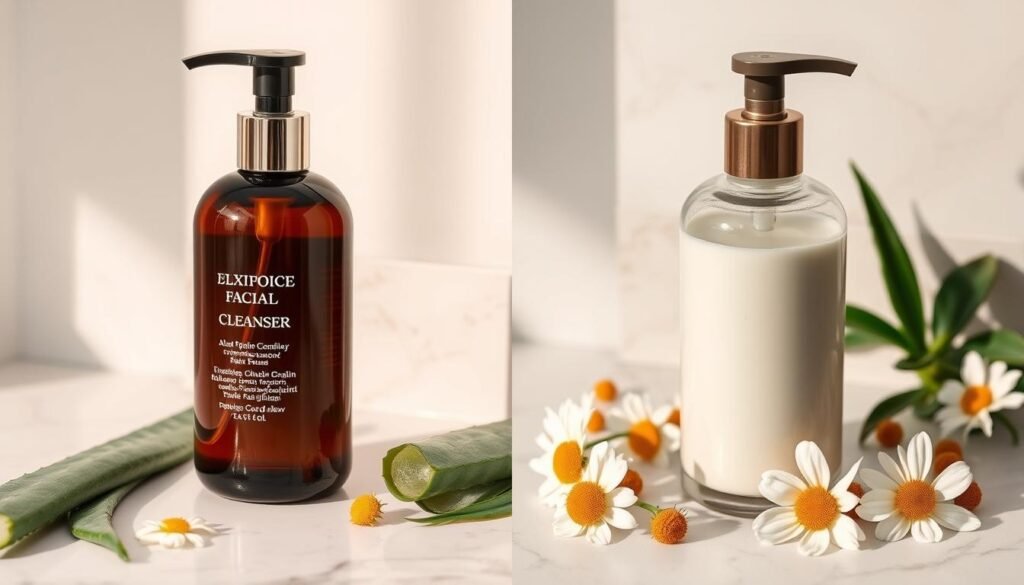
Knowing when to use a facial cleanser vs face wash is key. Use a facial cleanser at night to get rid of makeup and dirt. In the morning, a face wash helps remove oil from sleep. It’s important to use them right in your skincare routine.
Start your day with a gentle face wash to clean your skin. At night, a facial cleanser is better for removing makeup and pollutants. Double cleansing with both products ensures your skin is clean and ready for bed.
Morning Routine Guidelines
Begin your morning by washing your face with a gentle face wash. Massage it on for 30 seconds to 2 minutes. Then, rinse with lukewarm water and gently pat dry. This step removes oil and gets your skin ready for the day.
For more on skincare order, check out this link.
Evening Cleansing Protocol
At night, start by removing makeup and sunscreen with a gentle cleanser. Next, use a foaming face wash to deep clean. This double step removes all dirt and makeup, leaving your skin fresh.
Double Cleansing Method Explained
Double cleansing means using two cleansers one after the other. It’s good for all skin types and removes tough impurities. Start with a gentle cleanser or balm, then a foaming face wash for a deep clean.
Using the right products in the right order is key for a good skincare routine. By knowing the difference between facial cleansers and face washes, you can keep your skin healthy and glowing. While they’re similar, they serve different purposes for different skin needs.
Conclusion: Making the Right Choice for Your Skincare Needs
Choosing between a face wash and a cleanser depends on your skin type and needs. It’s important to know the difference between cleanser and face wash. Each product has its own way of cleaning and caring for your skin.
Face washes, like gels or foams, are great at deep cleaning. They remove oil, dirt, and other impurities from your pores. Cleansers, on the other hand, are gentler. They come in creams or lotions and are better for sensitive or dry skin. Using both face wash and cleanser can give you a complete clean.
Choosing between face wash vs. cleanser depends on your skin’s needs. Try different products and see how your skin reacts. Skincare is all about finding what works best for you. With the right mix of cleansers and face washes, you can get the glowing skin you want.
FAQ
Is a cleanser the same as a face wash?
What are the key differences between cleansers and face washes?
What are the main ingredients found in cleansers and face washes?
How do the pH levels and effects on the skin’s microbiome differ between cleansers and face washes?
Which product is better for oily or acne-prone skin?
What type of cleanser is best for dry or sensitive skin?
How should I incorporate face wash and cleanser into my daily skincare routine?
Source Links
- Face Wash vs. Face Cleansers: What are the Differences between Cleanser & Face Wash?| Neutrogena® – https://www.neutrogena-me.com/beauty-and-skincare-tips/face-care-tips/face-wash-vs-face-cleansers
- Face Wash vs Face Cleanser | What is the difference | NIVEA ME – https://www.nivea-me.com/en-me/advice/face-washes-vs-face-cleansers-which-is-better-for-you
- What’s The Difference Between Face Wash And Face Cleanser? – https://www.southernliving.com/fashion-beauty/skin/difference-between-cleanser-and-face-wash?srsltid=AfmBOoqcI_9hWgu52aTbuwZmtoeBsd8402UyXf3J-o_4kjDZ8tfOoX0M
- Understanding the Difference Between Cleanser and Face Wash – https://plumgoodness.com/blogs/skincare/55098817-cleanser-face-wash-whats-the-difference-when-to-use-what?srsltid=AfmBOorfBtevMt2MIfLrfG7ophrFLv5r2LOXKVvPWxo31BwPLbRhPrBx
- Face Wash Vs Cleanser: Which One Should You Use? – https://skinkraft.com/blogs/articles/difference-between-face-wash-and-cleanser
- What Is The Difference Between Cleanser And Face Wash? – https://www.sondskin.co.uk/blogs/discover/are-cleansers-and-face-wash-the-same?srsltid=AfmBOoqKhTLFGGELhO3fybWAP70IhKWlb3F-TNf3nKs9q3dSvsTERWf5
- What Is Cleanser & What Does Cleanser Do? | Charlotte Tilbury – https://www.charlottetilbury.com/us/secrets/what-is-cleanser?srsltid=AfmBOoqP3FA_PEVB_lGt1Sq6yk5l3UFSQIqHOSCMIO6c-PKy-EEl2zcz
- What’s the Ideal Facial Cleanser for Your Skin Type? – https://www.cerave.com/skin-smarts/skincare-tips-advice/how-to-choose-face-wash-cleanser-for-skin-type
- What’s The Difference Between Face Wash And Face Cleanser? – https://www.southernliving.com/fashion-beauty/skin/difference-between-cleanser-and-face-wash?srsltid=AfmBOoqgqOGxlry4Bfx7ziXYwh2hrVvUpVfI-Oj0odP5EDKLduDJzAoR
- What’s The Difference Between Face Wash And Face Cleanser? – https://www.southernliving.com/fashion-beauty/skin/difference-between-cleanser-and-face-wash?srsltid=AfmBOorpUJg9bEYTWbZnOFbNHiKUivp1Tjfgh3S2nF0pM17GXuIstsf_
- Cleanser vs. Face Wash: The Key Differences | NIVEA India – https://www.nivea.in/advice/face-wash-vs-cleanser
- Does the Order You Apply Your Skincare Products Really Matter? – https://www.dermstore.com/blog/how-to/what-order-do-i-apply-my-skin-care-products/?srsltid=AfmBOor1oSmuq6bJjo0a46oXlSWOhqdFkNnnMw9dyzK4MnQ1gsY7haXI
- Understanding the difference between face wash and cleansers – https://thedeconstruct.in/blogs/cleanser/are-facewash-and-cleanser-the-same?srsltid=AfmBOoobrv0yh-q-3UgvoBmj34Rslf2oTnCxwYtSw8FZovYGZEtln2oB
- Face Wash vs. Cleansers: Which One is Right for Your Skin Type? – https://vincebeauty.com/blogs/vince-blog/face-wash-vs-cleansers?srsltid=AfmBOop5bzIudDIjXNd0EX9G5ONp1zFHJ-wzcZis4dpEbUMSNUaOEvLG

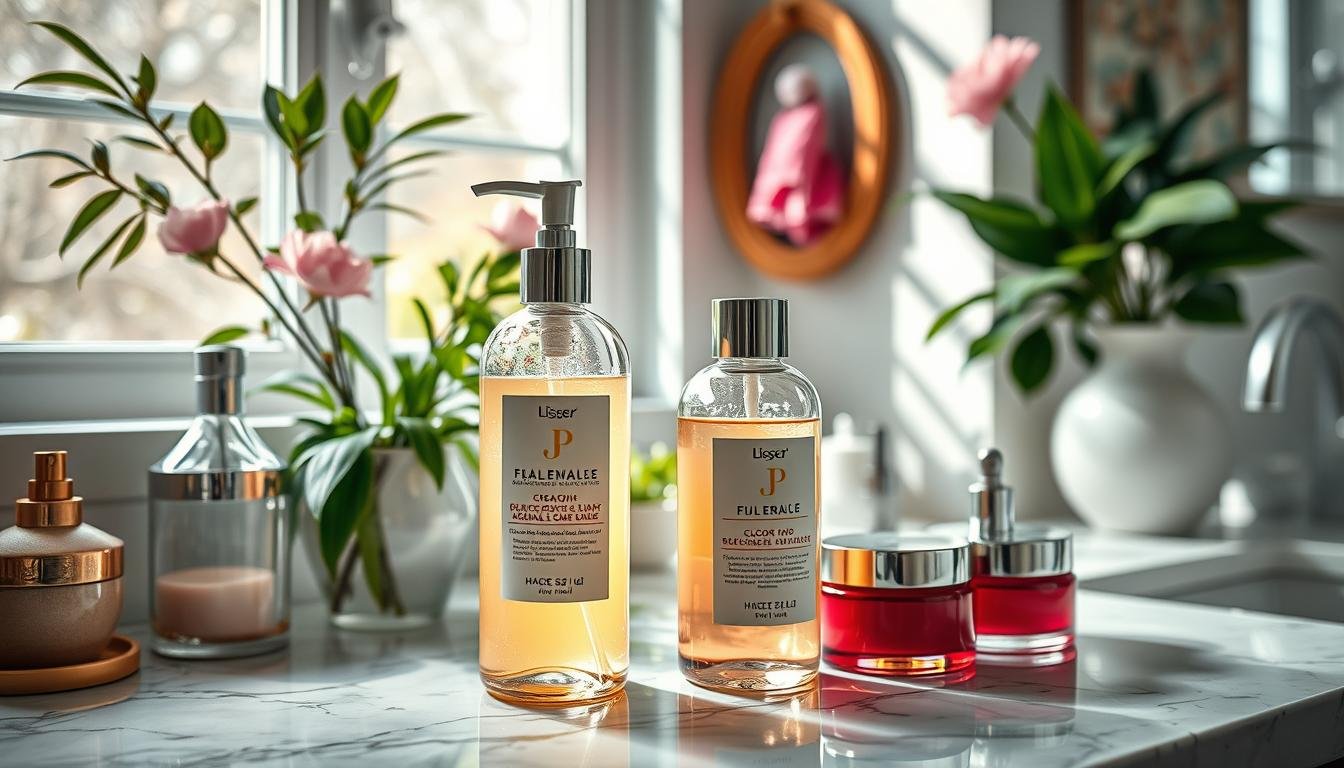

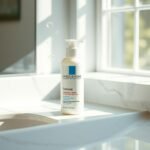
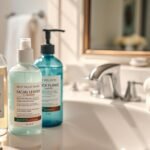
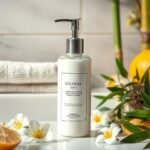
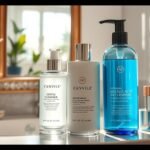

Interesting piece but honestly, arent we overcomplicating things here? Soap and water have worked for centuries, why change now? Just a thought.
Progress isnt overcomplication. Soap and water worked, but science improves lives.
Honestly, arent face wash and cleanser basically the same thing? Isnt this just marketing lingo to make us spend more? Thoughts? #SkincareScam?
Interesting article, but isnt soap just as effective? Maybe were overthinking this and spending way too much on fancy face products.
Honestly, arent face wash and cleanser just marketing gimmicks? Ive always used just soap and water and my skin is perfectly fine!
Honestly, I think this whole debate is overblown. Both just clean your face. Were overthinking this, guys. Its not rocket science.
Surely, the whole face wash vs. cleanser debate is just marketing spin. Isnt it all just soap at the end of the day?
Ive always thought face wash and cleanser were the same. Is it just some marketing ploy to make us buy two products?
Interesting read, but honestly, isnt this overcomplicating things? Just use water and a towel, guys. Skin problems solved!
Really, this whole face wash vs cleanser debate feels like a marketing ploy to me. Arent they just fancy names for soap?
Why all this fuss about face wash vs cleanser? Just use soap and water, guys. Its not rocket science! #soapandwatergang